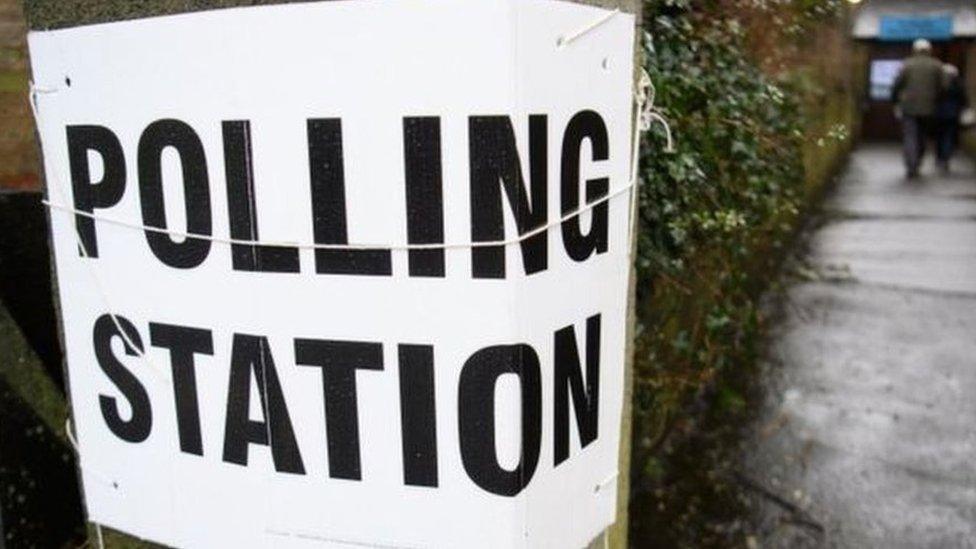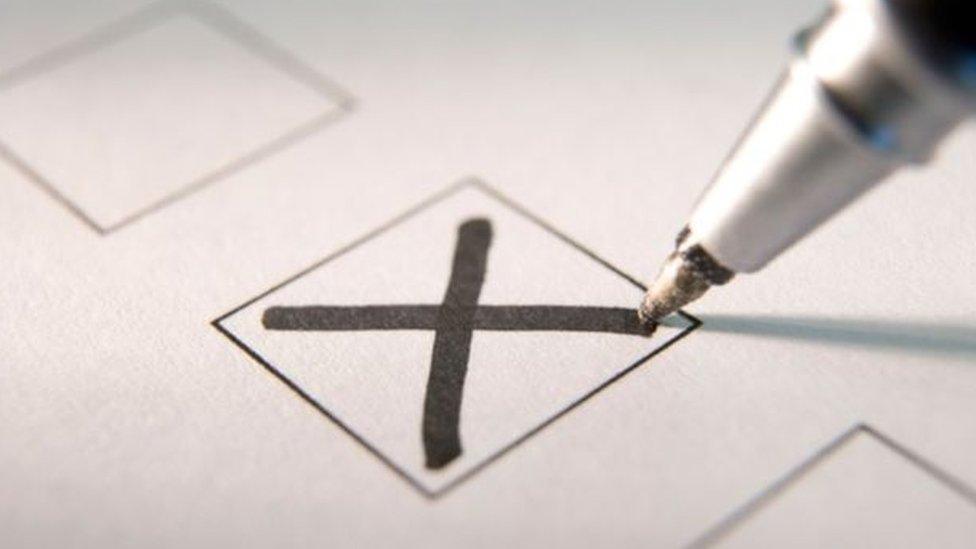Politicians woo voters ahead of 4 May poll
- Published
- comments

Political parties are taking to the streets in the last day of campaigning ahead of Thursday's local elections.
A total of 4,851 council seats are up for grabs across England, Wales and Scotland on 4 May.
The poll will give voters a chance to deliver verdicts on the major parties before the general election, which is being held on 8 June.
There are also eight mayoral elections, including elections in six new "combined local authorities".
The Manchester Gorton parliamentary by-election triggered by the death of Labour MP Gerald Kaufman was also due to take place, but has now been delayed until the day of the general election.
Theresa May surprised the political establishment by calling a snap general election last month, saying she wanted a stronger mandate as she heads into negotiations on taking Britain out of the European Union.
It means that, unusually, the local elections are taking place in the middle of a general election campaign.
Mrs May will be hoping her "strong and stable" government mantra will help the Conservatives gain council seats and take outright control of a slew of councils that are currently hung.
The Tories claim there is a £45bn black hole in Labour's spending plans, with chancellor Philip Hammond adding that a vote for Labour was a "high-risk gamble" which would leave Britons paying the price.

Local elections will be held in 34 councils in England, 32 in Scotland and 22 in Wales on 4 May.
Jeremy Corbyn, who claimed the Tory attacks showed an "air of desperation", will be hoping to confound the polls and show Labour is moving forward under his leadership - while UKIP faces a tough battle to hold on to the seats it won in England in 2013.
Labour turned the focus on health, saying it would suspend the planned closure of hospital services across England if it wins on 8 June. Mr Corbyn said his party in government would offer "good quality health care for everyone, everywhere".
He added: "We don't want excessively long journeys to get to A&E. We want the ambulance service to be able to cope."
UKIP has pledged to scrap the TV licence fee, cut foreign aid and get rid of green levies and taxes which it claims would save households about £100 a year on energy bills.
The elections will also indicate whether the Liberal Democrats are beginning to rebuild support after taking a hit in these seats four years ago, and at the 2015 general election.
Liberal Democrat leader Tim Farron had his campaign visit to Oxford disrupted by angry pensioner Malcolm Baker who claimed voters "do know, we did know" what they were backing in the EU referendum.
But Mr Farron insisted Mr Baker had only voted for Britain's departure from the EU, not the final deal. "He didn't vote for destination, he wasn't asked. None of us were asked," said Mr Farron, whose party reached 101,832 members on Tuesday afternoon, eclipsing the previous watermark of 101,768 set in 1994.
In Scotland, the Conservatives want to repeat the 2016 Holyrood election which saw them replace Labour as the second largest party.
New metro mayors
However, Scottish Labour leader Kezia Dugdale has urged voters to back her party in the local elections to protest against both Conservative "austerity" and SNP plans for a second independence referendum.
But Scotland's first minister Nicola Sturgeon said the local government elections "are not about independence". "Councils have a key role in driving our economy, building and protecting our communities and providing vital local services," she said.
"Tomorrow's vote is about choosing who is best placed to take decisions about the future of our communities."
The Scottish Greens are fielding a record 218 candidates and say they are building on existing councillor numbers in Edinburgh, Glasgow, Aberdeenshire, Midlothian and Stirling, and making breakthroughs in many other local authorities.
All 32 Scottish councils (1,227 seats) have elections. In 2012, the SNP won the most seats, but Labour was not far behind.
Apart from Anglesey, the Welsh councils (22 councils, 1,254 seats) were last contested in 2012, That was a very strong year for Labour, which made over 200 net gains at the expense of the other parties.
In England, (34 councils, 2,370 seats) this is a year of county council elections - a traditional area of strength for the Conservatives.
For the first time voters in Greater Manchester, the Liverpool City region, the West Midlands, Tees Valley, the West of England and Cambridge and Peterborough will elect new metro mayors.
Voting intentions
These mayors will mostly be responsible for economic development in their regions, but some will have powers over transport and housing.
Doncaster and North Tyneside are also voting for local authority mayors, who are elected leaders of their respective councils.
BBC senior elections and political analyst Peter Barnes urged caution over reading too much into the results of the local elections "to project the outcome of the general election"
"People vote differently in council elections - even in cases when they're held on the same day as a general election," he said.
"For example, the Liberal Democrats tend to do better at the local level. And there are still five weeks to go until 8 June. So while the results that are announced on Thursday night and Friday will give us some indications about how the general election might go, they won't tell us with any certainty what the outcome will be."